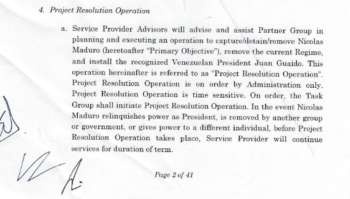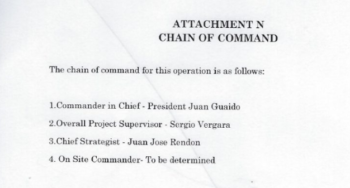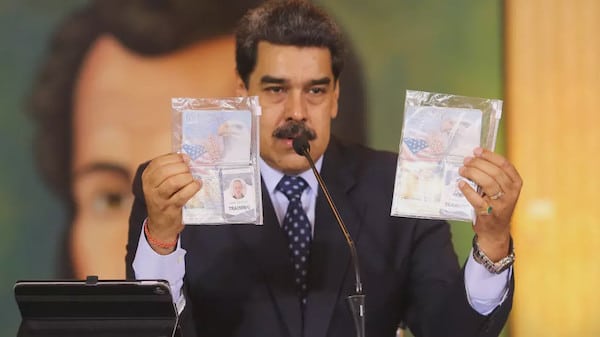Finally, the complete content of the contract signed by Juan Guaidó, Sergio Vergara and J.J. Rendón with the American mercenary firm Silvercorp, led by former military officer Jordan Goudreau, has been released.
Venezuelan Communication Minister Jorge Rodriguez, in a press conference from the Miraflores Palace a couple of days ago, provided a detailed analysis of the contract’s clauses and explained its scope and objectives, which included the physical elimination of President Nicolas Maduro and high authorities of the Venezuelan state.
With the evidence revealed so far, it has been established that Juan Guaidó had detailed knowledge of the contract he signed in order to promote the mercenary intervention against Venezuela that ran aground on its coasts on May 3.
 Although the self-proclaimed congressman has denied any connection through statements and evasive declarations, his advisor J.J. Rendón has confirmed the veracity of the contract while, on the other hand, the leaking of a new audio has revealed a conversation between Goudreau and Guaidó at the time of the closing of the agreement.
Although the self-proclaimed congressman has denied any connection through statements and evasive declarations, his advisor J.J. Rendón has confirmed the veracity of the contract while, on the other hand, the leaking of a new audio has revealed a conversation between Goudreau and Guaidó at the time of the closing of the agreement.
The content of the signed contract indicates that the physical elimination of President Nicolás Maduro and the high leadership of the Venezuelan state was the first objective within an operation that had as its general purpose the prolonged military occupation of the country at the hands of a private army of mercenaries.
1. The contract establishes that Silvercorp’s presence in the country would extend over 495 continuous days, acting as a “security force” for the fake government in order to “stabilize the country”.
While the operation to “capture / detain / eliminate Nicolas Maduro, eliminate the current government and install the recognized Venezuelan president Juan Guaido (sic)” was the primary objective, Guaidó pledged to honour the monthly payments to Silvercorp, even if the legitimate Venezuelan president, due to other circumstances, was removed from office before the armed incursion.
The payment for the services contracted could be made with oil barrels or by resorting to private investors. Silvercorp was committed to building a bridge between Guaidó and the investors, charging a 55% interest rate to be paid to Goudreau’s mercenary firm.
Following these clauses, Silvercorp would act as a financial intermediary between the fake government of Guaidó and the capitalists interested in obtaining an economic return from the illegal operations of the mercenaries in Venezuelan territory. Consequently, the contract was also a financial adventure and the navigation chart of artillery neo-liberalism. Goudreau’s company would become the star contractor of oil, mining and industrial companies that would have to hire the services of Silvercorp to operate in Venezuela “safely”.
This relationship between transnational companies and private mercenary firms is usual in Colombia, Iraq or Afghanistan, where corporations hire private security firms to protect their businesses in the midst of a low or medium intensity armed conflict. The business of war.
2. According to the contract, Silvercorp would act hand in hand with the fake government of Juan Guaidó and above the national defence and security institutions conceived in the Constitution of the Bolivarian Republic of Venezuela as the Bolivarian National Armed Force (FANB).
Goudreau’s power would be supra-constitutional and he would only be accountable to Guaidó. It would be above the FANB, the intelligence services and the police, exercising a capacity for unilateral action in various fields of military activity.
In this sense, the clauses of the contract imply the dissolution of the Bolivarian Republic, its public institutions and the system of human rights guarantees established in the country’s Magna Carta. The FANB would be replaced by a private occupying army and the heads of the public administration would be designated as “hostile forces”.
It was a scorched earth operation, where mayors, governors, judges, prosecutors, ministers and other authorities designated as “Chavistas” would be captured, persecuted or killed. Applying these techniques of state terrorism, the fake government of Guaidó would reorganize the Venezuelan state in all its organizational units.
The contract highlights that figures such as Diosdado Cabello, Nicolás Maduro and their “supporters” would be declared as such, which in concrete terms implied the persecution and capture of all public and institutional positions in the Venezuelan state.
Taking advantage of the de facto state of siege and with Silvercorp’s thugs in the streets of the country, it would forge the dismantling of the Bolivarian Republic, the physical disappearance of Chavism as a political and institutional force, and would create the conditions for the auctioning off of public companies for the benefit of the transnationals.
3. It is catastrophic (and also unprecedented) that a private contract with a mercenary company should be the source of the dissolution of Venezuela as we have known it. This is unparalleled in our republican history, and at a world level we would have to investigate if there are examples that could come close.
The contract signed by Guaidó establishes a reorganization of the state and a restructuring of our legal system. For example, one of the clauses establishes the installation of a Venezuelan Strategic Command (VSC), to which Silvercorp would answer. This supposed Command, which would have an unspecified but surely Silvercorp commander, would authorize illegal military operations against “hostile forces,” operational maneouvers to contain disturbances and demonstrations, and the arrest of persons identified with Chavismo.
Logically, the text assumes that once the Venezuelan constitutional government is overthrown, there will be demonstrations and disturbances calling for a coup d’état. To whitewash the illegal and murderous persecution of the Chavista counter-coup movement in the streets, Silvercorp designates all expressions against the fake government of Guaidó as “hostile forces”.
These include Hezbollah, the Colombian guerrilla group ELN, the “illegitimate Venezuelan forces “, collectives and the FANB itself. This clause fits in perfectly with the discourse of “Hezbollah’s presence in Venezuela,” propagated by the hawks and especially by Mike Pompeo and the head of the Southern Command, so it is clear that Silvercorp could associate itself with U.S. troops, with the Air Force and the Southern Command (deployed across the Pacific with several destroyers and one specifically loaned by the Fourth Fleet) to pursue supposed “terrorist elements”.
The diplomatic and illegal recognition of Juan Guaidó as “president in charge” would be enough to “legalize” the operations of the U.S. Navy, the Air Force and the landing of special forces in our territory to collaborate with the elimination of alleged targets of Hezbollah, the ELN, and other hostile forces. It would even enable the political conditions for the installation of U.S. military bases on a permanent basis and the conclusion of illegal treaties allowing the activities of U.S. agencies such as the CIA, FBI or DEA, as occurred in Colombia with “Plan Colombia” and in Mexico with the “Merida Initiative”.
In general terms, the contract opened the door to a conventional US intervention, unilateral and outside the UN Security Council, to control power in the face of a widespread military and civil uprising after the coup d’état, as Chavismo would still retain military, police and popular structures to confront the invaders.
4. The contract also dissolves Venezuelan legislation in criminal terms and effectively suspends all institutions responsible for ensuring the protection of the population’s basic rights.
Silvercorp established that through the irregular CSO unit, and by unilateral order of the alleged VSC, it would be possible to carry out arrests of persons, searches of spaces and homes, captures and other measures of repression of “hostile forces” or those who are presumed to be collaborating with the “allied forces of the former regime. In this sense, it states what the “crimes” of the post-coup will be: to be a Chavista, a civil servant, a police officer or a soldier who does not surrender to the Silvercorp thugs “commanded” by Guaidó, their “Commander in Chief” in accordance with the contract.
 These arrests would be made illegally when there is “reasonable suspicion”, and would not be subject to any institutional mandate, so those arrested and persecuted would have institutions such as the Prosecutor’s Office or the judicial system to defend them. Goudreau’s army of thugs would be transformed into a prosecutor’s office, a court and an executioner simultaneously.
These arrests would be made illegally when there is “reasonable suspicion”, and would not be subject to any institutional mandate, so those arrested and persecuted would have institutions such as the Prosecutor’s Office or the judicial system to defend them. Goudreau’s army of thugs would be transformed into a prosecutor’s office, a court and an executioner simultaneously.
In order to massify these techniques of state terrorism, the contract grants a supposed legality to the murder of innocent civilians after falsely accusing them of belonging to the “hostile forces” described in the document. Accusing a CLAP leader or a stratum of community leaders from the Caracas slums as “collaborators of the ELN or Hezbollah” or “hindering some mission”, of “being associated with terrorists or drug trafficking”, would be enough to get them killed.
In that sense, the Silvercorp contract is a tool for carrying out genocide, as identified by the International Criminal Court (ICC). It is genocide
“Any of the following acts committed with intent to destroy, in whole or in part, a national, ethnic, racial or religious group as such: (a) Killing members of the group; (b) Causing serious bodily or mental harm to members of the group; (c) Deliberately inflicting on the group conditions of life calculated to bring about its physical destruction in whole or in part”.
5. Silvercorp also offered its services to set up an Assets Unit to pursue and capture the country’s assets in the hands of the state. According to the contract, Guaidó should pay a fee of 14% in relation to the real value of the “recovered” property.
However, the financial and legalistic jargon that they are trying to give to the wording of this clause does not succeed in concealing that they would be authorizing a mega operation of trafficking in cultural property, typical of mercenary groups, and condemned by the resolutions of the United Nations.
Likewise, according to the contract, Silvercorp would assume the reins of the Venezuelan state by being empowered to carry out police activities, shaping legislation to outlaw Chavism and authorizing military manoeuvres against the civilian population and government structures falsely accused of “collaborating” with “hostile forces”. The use of anti-personnel mines and large-scale armed operations is authorized directly against public institutions, FANB structures and Bolivarian Government headquarters where the “crimes” previously defined by Goudreau are committed.
Although the operation is based on an underestimation of Chavism’s resistance capacity, it is important to note that the contract itself establishes in its calculations the form of government that Venezuela would have after Maduro’s elimination. It is a statement of purpose.
The “state model” that the contract projects is dangerously similar to the “Commonwealth” with which the U.S. justified its military and political occupation of the Philippines after the war over its colonial rule with the Spanish Empire. Also scandalous is the similarity to the Platt Amendment applied to Cuba in the early 20th century and the current colonial status of Puerto Rico.
They seek to build a military occupation regime with annexationist features.
The ideas that have shaped the contract establish that Venezuela would lose its status as a sovereign republic, to become a military regime, in parliamentary disguise (that’s where the Guaidó puppet would come in), occupied and directed by the United States.
This scheme of thinking is related to the US occupation (wrongly called stabilization) in Iraq.
Let us remember that after the military intervention, Washington appointed Paul Bremer (a hawk linked to Dick Cheney and Henry Kissinger) as its administrator for Iraq, transferring to him powers that were within the scope of the Hussein government.
Bremer, as president of the Coalition Provisional Authority (CPA), would be in charge of “rebuilding the country” by authorizing oil contracts to US companies, facilitating army incursions and creating a new framework for pursuing Baathism. The U.S. ruled the country by militarizing and expanding the towering British colonial model.
Bremer’s neocolonial management updated, through the geopolitical prism of the hawks, the model of governance through an army of occupation that would lead the country’s destiny and control the institutions for the benefit of private corporations.
For this reason, the Silvercorp contract establishes the armed path to neoliberalism, illegally transferring the country’s security and defence powers to Goudreau’s mercenary firm.
With these tools, the country would be pushed into a phase of fragmentation, institutional dissolution and “somalization”, where large corporations could take control, through the hiring of mercenaries, of oil wells, gas fields and gold mines in the face of the annulment of the rule of law and the destruction of the country’s monopoly over its strategic resources.
The current coordinates of the geopolitical conflict have also woven the clauses of the contract: the voracity of a capitalism in crisis, in times of pandemic, fights with the nation-state for control of higher rates of profit and exploitation.
In the Venezuelan chapter of this rising Third World War, the document exposes the geopolitical drive to reduce the state’s obstacles to the benefit of the circulation of liquid, flexible capital without border and institutional control.
And it was the armed route that Washington chose to precipitate this operation of constitutional and political resetting of the Homeland.

